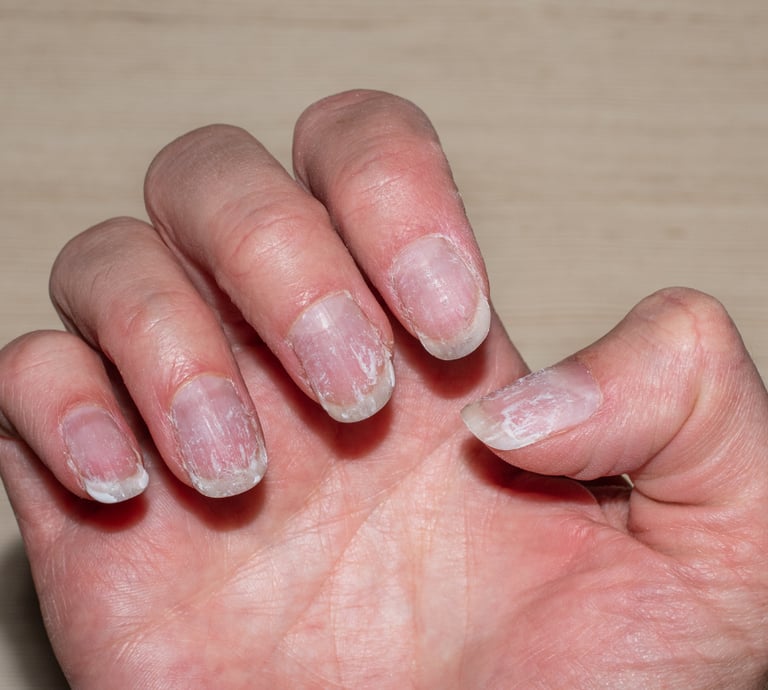Brittle Nails
Brittle nails can be a frustrating and common issue, characterized by their tendency to split, break, or peel easily. Various factors, including environmental influences, nutritional deficiencies, and underlying health conditions, can contribute to this problem.
Understanding the causes and recognizing the symptoms of brittle nails is essential for effective treatment and prevention. With the right care and attention, you can strengthen your nails and restore their natural beauty.


Strong Nails, Stronger You: Restore Your Nail Health Today!
Don’t Let Brittle Nails Hold You Back: Restore Strength and Shine!
Preventive Tips for Stronger, Healthier Nails
Brittle Nails
What It Is:
Onychoschizia refers to a condition characterized by brittle nails that are prone to splitting, softening, and thinning. This condition is relatively common and can affect individuals of all ages, though it tends to be more prevalent in women, particularly as they age.
Causes:
Brittle nails can result from a variety of factors, including:
Aging: As individuals age, their nails may become weaker and more susceptible to damage.
Nutritional Deficiencies: Lack of essential nutrients, such as biotin, zinc, or protein, can contribute to nail brittleness.
Moisture Imbalance: Excessive exposure to water and harsh chemicals can strip the nails of their natural moisture, leading to dryness and brittleness.
Environmental Factors: Frequent exposure to cold weather, low humidity, and harsh cleaning products can weaken nails over time.
Underlying Health Conditions: Conditions such as hypothyroidism, psoriasis, and eczema can affect nail health and contribute to brittleness.
Symptoms:
Symptoms of onychoschizia may include:
Split or chipped nails
Peeling layers of the nail
Soft or thin nails that are easily damaged
Nail bed discoloration
Prevention and Care:
To help prevent and manage brittle nails, consider the following care practices:
Moisturize Regularly: Apply hand creams and nail oils to keep nails hydrated.
Avoid Harsh Chemicals: Use gentle soaps and cleaning products, and wear gloves when performing household chores.
Limit Water Exposure: Reduce prolonged exposure to water by wearing gloves while washing dishes or cleaning.
Maintain a Balanced Diet: Ensure adequate intake of vitamins and minerals essential for nail health, such as biotin, zinc, and proteins.
Trim Regularly: Keep nails trimmed to minimize the risk of splitting and damage.
Avoid Nail Hardening Products: Some hardening treatments may contain harmful chemicals that can worsen brittleness.
When to See a Doctor:
If brittle nails are accompanied by other symptoms, such as discoloration, pain, or changes in the nail bed, it is advisable to consult a healthcare professional. They can evaluate for any underlying health conditions and recommend appropriate treatments or lifestyle changes.
Causes of Brittle Nails
Brittle nails, or onychoschizia, can be attributed to a variety of factors. While nail abnormalities are occasionally linked to underlying health issues such as iron deficiency and thyroid disease, most cases of brittle nails stem from environmental and lifestyle influences. Here are some common causes:
Overexposure to Water:
Frequent handwashing, swimming, or soaking in water can lead to nails becoming overly hydrated. This constant wetting and drying cycle causes the nails to expand and contract, resulting in brittleness over time.
Harsh Soaps and Detergents:
Prolonged contact with strong soaps, detergents, and cleaning products can strip the nails of their natural oils, leading to dryness and increased brittleness. These chemicals can weaken the nail structure, making them more susceptible to damage.
Overuse of Nail Polish:
Regular application of nail polish, especially those containing harsh chemicals, can weaken nails. Additionally, using acetone-based nail polish removers can further dry out the nails and lead to brittleness.
Manicures and Nail Treatments:
Frequent manicures, especially those involving acrylic or gel nails, can cause trauma to the natural nail bed. Over time, this can result in softening and splitting of the nails.
Repeated Trauma:
Engaging in activities that subject the nails to repeated trauma, such as typing, playing certain musical instruments, or manual labor, can contribute to nail damage and lead to brittleness.
Nutritional Deficiencies:
A diet lacking essential nutrients, such as vitamins (especially biotin), minerals (like zinc), and proteins, can impact nail health. Insufficient nutrition can hinder nail growth and strength.
Dryness:
Environmental factors, such as low humidity or cold weather, can dry out nails, causing them to become brittle and prone to breaking.
Overexposure to Moisture:
Conversely, while excessive dryness is a common cause, nails can also become soft and peel when they are consistently overexposed to moisture without adequate care.
To maintain healthy nails, it is essential to recognize these potential causes and implement preventive measures. Avoiding excessive exposure to water and harsh chemicals, moisturizing regularly, and maintaining a balanced diet can all contribute to healthier, stronger nails. If brittleness persists or is accompanied by other symptoms, it may be beneficial to consult a healthcare professional for further evaluation.
Managing Brittle Nails
Brittle nails can be a nuisance, but with the right care and practices, you can improve their strength and overall appearance. Here are some effective strategies to manage and prevent brittle nails:
Limit Water Exposure:
Try to avoid unnecessary exposure to water, which can weaken nails. When washing dishes or doing general housecleaning, wearing rubber gloves can protect your nails from excessive moisture and harsh cleaning agents.
Give Your Nails a Break:
Take breaks from manicures, nail polish, and nail polish removers. This allows your nails to recover from potential damage caused by chemicals and frequent applications.
Moisturize Regularly:
Keep your hands and nails well-moisturized. Use a quality hand cream or cuticle oil to maintain hydration and prevent dryness. Regular moisturizing can help strengthen the nail structure and prevent brittleness.
Proper Nail Cutting:
When cutting your nails, aim to cut them straight across or slightly rounded to prevent snagging and breaking. Use sharp nail clippers or scissors to achieve a clean cut without causing trauma to the nail.
Filing for Maintenance:
Regularly file your nails to smooth out any ragged edges, which can help prevent further damage. Use a non-metal file and buff the nails in the direction of nail growth to minimize the risk of splitting.
Avoid Nail Biting and Trauma:
Refrain from biting your nails or using them to open packaging, as these habits can lead to trauma and exacerbate brittleness. Being mindful of how you use your nails can help maintain their integrity.
Consider Supplementation Carefully:
While some people consider over-the-counter supplements like Biotin to improve nail health, there is insufficient evidence to recommend them specifically for brittle nails. Additionally, these supplements can interfere with common blood tests. It's best to consult a healthcare professional before starting any supplementation.
By incorporating these practices into your nail care routine, you can significantly reduce the occurrence of brittle nails and promote healthier nail growth. If your brittle nails persist or are accompanied by other symptoms, it may be wise to consult a healthcare professional for further evaluation and personalized advice.
Contact a Dermatologist






